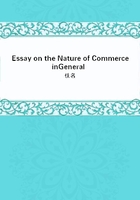
第22章
The more Labour there is in a State the more naturally rich the State is esteemed In a long calculation worked out in the supplement it is shown that the labour of 25 grown persons suffices to provide 100 others, also grown up, with all the necessaries of life according to the European standard. In these estimates it is true the food, clothing, housing, etc. are coarse and rather elementary, but there is ease and plenty. It may be assumed that a good third of the people of state are too young or too old for daily work and that another sixth are proprietors of land, sick, or undertakers of different sorts who do not by the labour of their hands, contribute to the different needs of men. That makes half the people without work, or at least without the work in question. So if 25 persons do all the work needed for the maintenance of a hundred others, there remain 25 persons out of the hundred who are capable of working but would have nothing to do.
The soldiers, and the domestic servants in well-to-do families, will form part of these 25; and if all the others are busied in working up by additional labour the things necessary for life, like making fine linen, fine cloth, etc. the state will be deemed rich in proportion to this increase in work, though it add nothing to the quantity of things needed for the subsistence and maintenance of man.
Labour gives an additional relish to food and drink. A fork, a knife, etc. nicely wrought, are more esteemed than those roughly and hastily made. The same may be said of a house, a bed, a table and everything needed for the comfort of life.
It is true that it is of little difference in a state whether people are accustomed to wear coarse or fine clothes if both are equally lasting, and whether people eat nicely or coarsely if they have enough and are in good health, since drink, food, clothing, etc. are equally consumed whether fine or coarse, and that nothing is left in the state of this sort of wealth.
But it is always true to say that the states where fine cloths, fine linen, etc. are worn, and where the feeding is dainty and delicate, are richer and more esteemed than those where these things are ruder, and even that the states where one sees more people living in the manner of the first named are more highly esteemed than those where one sees fewer in proportion.
But if the 25 persons in a hundred of whom we have spoken were employed to produce permanent commodities, to draw from the mines iron, lead, tin, copper, etc. and work them up into tools and instruments for the use of man, bowls, plates and other useful objects much more durable than earthenware, the state will not only appear to be richer for it but will be so in reality.
It will be so especially if these people are employed in drawing from the earth gold and silver which metals are not only durable but so to speak permanent, which fire itself cannot destroy, which are generally accepted as the measure of value, and which can always be exchanged for any of the necessaries of life: and if these inhabitants work to draw gold and silver into a state in exchange for the manufactures and work which they produce and send abroad, their labour will be equally useful and will in reality improve the state.
The point which seems to determine the comparative greatness of states is their reserve stock above the yearly consumption, like magazines of cloth, linen, corn, etc. to answer in bad years, or war. And as gold and silver can always buy these things, even from the enemies of the state, gold and silver are the true reserve stock of a state, and the larger or smaller actual quantity of this stock necessarily determines the comparative greatness of kingdoms and states.